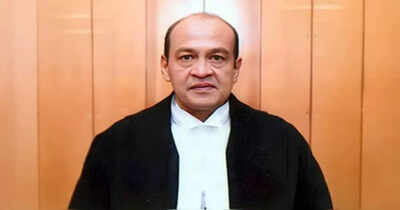ARTICLE AD BOX

Yashwant Varma (File photo)
High court judge Yashwant Varma and his family members had “covert or active control” over the store room where a large stack of half-burnt cash was discovered, a finding that amounts to serious misconduct and justifies his removal from office, reported news agency PTI citing the inquiry panel’s report into the incident.The three-judge inquiry committee, headed by Punjab and Haryana high court Chief Justice Sheel Nagu, conducted the probe over ten days. The panel examined 55 witnesses and visited the site of the accidental fire, which broke out around 11.35 pm on March 14 at the official residence of Justice Varma, then serving in the Delhi high court and now a judge of the Allahabad high court.Based on the panel’s findings, former Chief Justice of India (CJI) Sanjiv Khanna wrote to President Droupadi Murmu and Prime Minister Narendra Modi, recommending Justice Varma’s impeachment.“This committee thus holds that the cash/money was found in the store room of 30 Tughlak Crescent, New Delhi officially occupied by Justice Varma. More so, the access to the store room has been found to be within the covert or active control of Justice Varma and his family members and that by way of strong inferential evidence, it is established that the burnt cash/money was got removed from the store room during the wee hours of 15.3.2025 from 30 Tughlak Crescent, New Delhi,” the panel noted in its detailed 64-page report.
The report further stated, “Keeping in view the direct and electronic evidence on record, this Committee is firmly of the view that there is sufficient substance in the allegations raised in the letter of the Chief Justice of India dated March 22, and the misconduct found proved is serious enough to call for initiation of proceedings for removal of Justice Varma...”The committee meticulously examined the testimonies of all 55 witnesses, including Justice Varma himself, following the procedure outlined by the in-house inquiry mechanism.Citing the "Restatement of Values of Judicial Life" adopted by the Supreme Court in its full court meeting in 1997, the panel concluded, “It is obvious that all the virtues expected from a Judge are founded upon the concept of probity.”It observed that the standard of probity for judges is significantly higher than that expected of holders of civil posts. This expectation, the panel said, becomes “predominant, relevant and indispensable” when concerning judges in the higher judiciary.“The expectation of the general public from a member of the superior judiciary is extremely high. Probity is the most important and indispensable attribute of a person holding judicial office and is rather the basic eligibility criteria. Least that is expected of any judicial officer of district or higher judiciary is unimpeachable character and conduct in and outside the courtroom,” the report underlined.The panel pointed out that the legitimacy of the judicial office rests on public trust, and the degree of this trust is directly tied to the behaviour and conduct of the judge, both within and beyond the courtroom.“Any deficiency in this regard erodes public trust, which ought to be viewed stringently,” the panel said as it recommended the initiation of impeachment proceedings against Justice Varma.Besides Chief Justice Nagu, the inquiry committee included Chief Justice GS Sandhawalia of the Himachal Pradesh high court and Justice Anu Sivaraman of the Karnataka high court.The panel, which was set up by former CJI Khanna on March 22, had investigated the fire that erupted late at night on March 14 at Justice Varma’s official residence at 30 Tughlak Crescent in New Delhi.What initially appeared to be a routine fire incident escalated into grave allegations of judicial misconduct and breach of public trust.Several eyewitnesses, including police officers and firefighters, informed the panel that they saw charred bundles of Rs 500 notes scattered on the premises.One eyewitness recounted being “shocked” at the sight, stating, “There was a large pile of cash… I saw it for the first time in my life.”The inquiry was structured around three key issues, all of which were examined in depth.The first question posed by the panel was, “How does Justice Varma account for the presence of money/cash in the room (store room) located in his premises 30 Tughlak Crescent...?”Justice Varma was asked to clarify the origin of the money discovered at the scene.Another critical issue was, “Who is the person who had removed the burnt money/cash from the store room in the morning of March, 15.”The panel expressed reservations about the testimony provided by Justice Varma’s daughter, who was present at the residence on the night of the incident.“From the demeanor of the witness, we noticed that she is a confident young woman, having been subjected to hostel life throughout her education apart from being an independent working woman. This belies her statement that she was totally overwhelmed and panicked by the incidents of the fateful night...,”
the panel remarked.The committee also extensively analysed and rejected Justice Varma’s defence, in which he claimed that the entrance to the store room was under constant CCTV surveillance and managed by security personnel, making it highly unlikely for cash to have been stored there.



.png)
.png)
.png)
















 4 hours ago
3
4 hours ago
3









 English (US) ·
English (US) ·